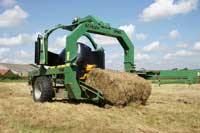Snow affected farmers chase feed supplies

The extreme cold weather and tighter supplies have given a significant boost to hay prices, as farmers look to secure the feed they need to see their livestock through the winter.
At this week’s St Ives annual hay and straw sale by Alexanders of Huntingdon, 1500t sold to record levels, with buyers coming from as far afield as the north of England, the south-west, Wales and Northern Ireland
“There was a very strong trade for all varieties of hay and straw, though I’d say the hay showed the effects of the cold weather more,” said auctioneer Michael Alexander. The firm prices were also helped by the reduced entry this year.
For example, big square bales of meadow hay (Claas Quads) were fetching between £40 and £45 each for good quality lots – about £10/bale more than last year. Meanwhile, seed hay sold to a top price of £51/bale for 161 quadrant bales.
“Had we had the sale three weeks ago, I reckon we would have been looking at prices of £30-£35 a bale, so the cold snap has added about 30%,” said Mr Alexander. “Everything comfortably cleared the reserve price, and we had a total sell out.”
Conventional bales of meadow hay averaged £3.54, equivalent to £132/t and some £28/t up on last year’s sale. Straw was a bit firmer for conventional bales, but similar to last year for big bales.
Auctioneers Adkin of Wantage, Oxon, also reported a strong trade at its annual sale on Tuesday (12 January), with hay in particular making a significant premium over last year.
“The cold weather has sharpened the hay trade as people realise their own stocks are pretty low,” said auctioneer Philip Pocock. “There was a lot of third rate hay made last year – especially in the south-west and Wales – so buyers contested strongly for the quality stuff we had on offer.”
Big bales of seed hay sold to £34/bale for Claas 2100 bales, while Claas quadrant meadow hay made almost £28/bale. Barley straw sold to £20.50/bale, with wheat straw topping at £15.90.
Compound feedOn the compound feed side, manufacturers report that prices have risen slightly, though these increases were not related to the weather. Tony Bell, raw materials director for BOCM Pauls, said ruminant rations were typically up £5-£7/tonne in January, reflecting the normal monthly carry, plus some increase in the cost of raw materials. “Just about every raw material has firmed since the autumn – for example rapemeal is up about £30-£40/t. We take a lot of forward cover, so prices to farmers are not really affected. The biggest problem we have faced is actually getting feed on to farms.” George Perrott, head of feed at the Agricultural Industries Confederation, said compounders were working flat out to meet farmer demand and welcomed the decision by the Department for Transport to extend the number of hours drivers are legally allowed to work. (see News, p10) “At one point last week our members were only able to deliver 30-40% of what had been ordered and there was a massive backlog,” he said. “There are still regional difficulties, for example in Cumbria, parts of Scotland and the south-west. But things are improving.” |
|---|
* What is the cost of the “big freeze”? See Phil Clarke’s Business Blog

